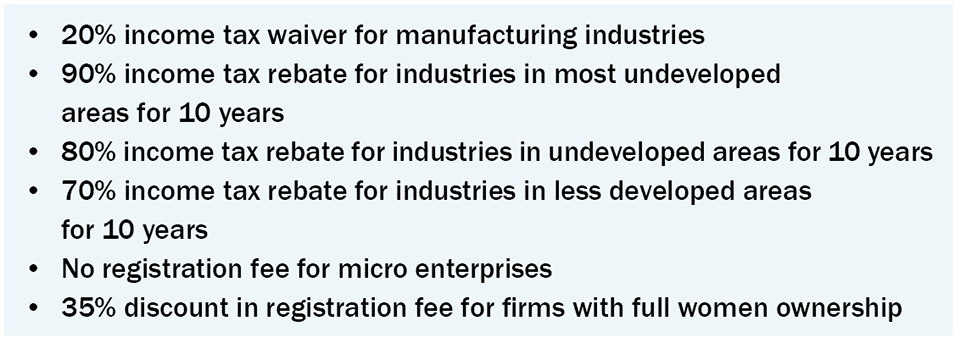Govt proposes attractive incentives to lure private investments

March 24: The government has proposed various incentives, subsidies, facilities, and tax waivers for industries in the new bill to integrate and amend the existing Industrial Enterprises Act.
The government’s move to substantially raise the incentives and other facilities for industries comes in the wake of growing complaints from the private sector about the lack of government’s support for creating environment conducive for investment.
The new bill that was recently approved by the cabinet will enter into the legislation process after the government registers it in the parliament.
The government has offered 20 percent waiver on income tax of manufacturing industries. Similarly, the new bill proposes 90 percent income tax rebate for manufacturing industries established in most undeveloped areas, 80 percent in undeveloped areas, and 70 percent in less developed areas for 10 years from the date of commercial production or operation of the industries.
The bill lists 22 districts as the most undeveloped areas, 18 districts as undeveloped areas, and 20 districts as less developed areas.
Similarly, manufacturing and service providing companies established with a capital of Rs 1 billion and providing jobs to over 500 people throughout the year will be entitled for full exemption of income tax for the first five years of operation. They will get 50 percent waiver in the next three years, according to the proposed bill.
Hydropower companies or solar, wind, or bio energy projects who have got license for production, transmission and distribution by 2024 will also get full exemption of income tax for 10 years and 50 percent for the next three years.
Tourism industries established with a capital of over Rs 2 billion will also get full waiver of income tax for the first five years of operation and 50 percent in the next three years, according to the proposed bill.
Similarly, huge income tax waiver is also proposed for those industries who create employment opportunities. For example, if any manufacturing industry and information technology company provides jobs to 300 or more Nepali citizens, such company will get 15 percent income tax waiver for that year. Such waiver will be 25 percent for any industry providing employment to 1,200 or more Nepali citizens. Fifty percent employment to women, Dalit and people living with disability means additional 15 percent discount on annual income tax, according to the proposed bill.
Similarly, the bill has proposed nearly a dozen expenditure activities that are deductable for income tax purpose. They include: life insurance of employers, 50 percent spending on recycling and pollution controlling system and equipments, expenditure on machine and equipment for reducing energy consumption or energy efficiency, among others.
The new bill also has nearly half a dozen provisions related to the waiver on the customs tariff waiver. Micro enterprises will not have to pay any fee or registration charges while those already in operation will get income tax waiver for minimum five years.
Women entrepreneurs will also get 35 percent discount on the registration fees if the firm or industry is registered fully under the ownership of women.
• 20% income tax waiver for manufacturing industries
• 90% income tax rebate for industries in most undeveloped
areas for 10 years
• 80% income tax rebate for industries in undeveloped areas for 10 years
• 70% income tax rebate for industries in less developed areas
for 10 years
• No registration fee for micro enterprises
• 35% discount in registration fee for firms with full women ownership
This news was taken from myRepublica and there is no involvement of Nepal Tax Online in preparation of this news.
Media Roundup includes tax related news coverage in media, Nepal and abroad, that we find useful to share to our readers. We do not own the contents of these news articles, and Nepal Tax Online team is not included in the process of publication of these news. We also do not vouch for authencity when publishing. The source of the news article is published at the bottom of each news, where possible.



